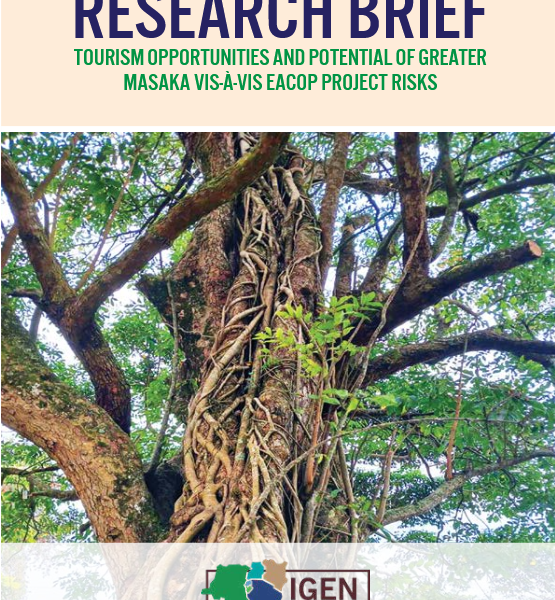MEDIA FOR CHANGE NETWORK
New report: EACOP threatens tourism and biodiversity in Greater Masaka.
Published
10 months agoon

By Witness Radio team.
A new report urgently warns about the imminent threats posed by the East African Crude Oil Pipeline (EACOP) to the tourism sites of the Greater Masaka subregion, demanding immediate attention and action.
In a recently released research brief by the Inclusive Green Economy Network-East Africa (IGEN-EA), “Tourism Potential of Greater Masaka vis-à-vis EACOP Project Risks,” IGEN-EA reveals the area’s diverse tourism prospects. These prospects bring massive wealth to the country as a result of its rich biodiversity and tourist attractions, but they are at risk of destruction by the EACOP project.
The EACOP project involves the construction of a 1,444km heated pipeline from Hoima in Uganda to Tanga in Tanzania, which will transport crude oil from Tilenga and Kingfisher fields. The project has been widely criticized for its environmental and social concerns. The pipeline has displaced at least 13,000 people in Uganda and Tanzania.
Experts say the Masaka subregion has sustainable tourism potential. However, the EACOP could negatively impact it by further fueling the climate crisis, causing biodiversity loss, and driving a population influx, among other things.
The Inclusive Green Economy Network-East Africa (IGEN-EA) is a network that unites over thirty-six (36) private sector players and civil society organizations (CSOs) from Uganda, Kenya, and Tanzania. The organizations undertake research, raise stakeholder awareness, and advocate to promote green economic alternatives, including clean energy, sustainable tourism, organic agriculture and fisheries, forestry, and natural resources management.
Located in southern Uganda and bordering Tanzania, Greater Masaka comprises nine districts: Kalungu, Masaka, Rakai, Sembabule, Lwengo, Kalangala, Lyantonde, Bukomansimbi, and Kyotera. Four of these, Kyotera, Rakai, Sembabule, and Lwengo, are crossed by the eacop mega project, which transports crude oil from Hoima to Port Tanga of Tanzania.
The research study’s findings reveal that the 1,443km EACOP is set to affect River Kibale/Bukora in Kyotera and Rakai districts. The river is one of the most important in the Sango Bay-Musambwa Island-Kagera (SAMUKA) Ramsar Wetland System, renowned for hosting 65 mammal species and 417 bird species. Further, the EACOP is set to affect River Katonga, the water body on whose banks Bigo by Mugenyi, a UNESCO World Heritage site, is located.
According to the Uganda Bureau of Statistics Report 2024, tourism contributed approximately 4.7% to Uganda’s GDP, and the sector has experienced significant recovery and growth. However, destroying essential tourism sites poses substantial risks to the industry.
The report underscores that the construction, operation, and decommissioning of the EACOP could lead to the irrevocable loss of the biodiversity mentioned above. This grave concern could significantly diminish Greater Masaka’s tourism potential.
“The proposed construction method of the EACOP, the open cut method, as well as the planned monitoring of the EACOP, including at river crossings, every five years and using the pigging method, instead of cathodic protection for corrosion control purposes, puts rivers and Ramsar sites at risk of oil pollution among other impacts. This could cause biodiversity loss and affect scenic views, negatively impacting tourism potential”. The report further reads.
Research report also estimates that the full value chain carbon emissions of the EACOP, which includes emissions from all stages of the pipeline’s life cycle, including extraction, transportation, and refining, are projected at over 379 million metric tonnes over 25 years.
“Carbon emissions are a driver of climate change, which has been implicated in contributing to biodiversity loss, including in Uganda. The climate risks of the EACOP thereby present a risk to eco- and agro-tourism in the Greater Masaka sub-region.” The research adds.
However, the report further implored the Ministry of Tourism, Wildlife, and Antiquities, through the Uganda Tourism Board (UTB), to prioritize the development of highlighted sites and promote cultural tourism in the subregion.
According to Mr. Dickens Kamugisha of the Africa Institute for Energy Governance (AFIEGO), the government claims that projects like EACOP are aimed at addressing poverty are unrealistic.
He noted that such projects have instead triggered biodiversity concerns, contributed to climate change, and posed significant social risks, such as increased crime rates and disruption of local communities. He emphasized that investing in sustainable economic activities such as tourism would benefit the government and private sector more.
Mr. Paul Lubega Muwonge, a member of IGEN-EA, emphasizes the crucial role of research in tourism product development and its value in laying a strong foundation for all operations.
“Research is an important and desired step in tourism product development; it sets a stronger foundation in all operations. We hope that the Ugandan government and development partners will use this research to harness the benefits of tourism by launching tourist activities in the Greater Masaka sub-region, Masaka.” He said.
Related posts:

 A 29th Insurance Company withdraws support for controversial EACOP Project.
A 29th Insurance Company withdraws support for controversial EACOP Project.
 Uganda: StopEACOP Campaign Condemns Standard Bank’s Decision to Fund EACOP
Uganda: StopEACOP Campaign Condemns Standard Bank’s Decision to Fund EACOP
 Appellate Division of the East African Court of Justice (EACJ) to hear an Appeal filed by CSOs which seeks to reinstate a petition against the construction of the EACOP project tomorrow.
Appellate Division of the East African Court of Justice (EACJ) to hear an Appeal filed by CSOs which seeks to reinstate a petition against the construction of the EACOP project tomorrow.
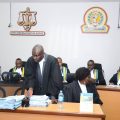 The East Africa regional court dismisses a case challenging the construction of the EACOP project.
The East Africa regional court dismisses a case challenging the construction of the EACOP project.
You may like
MEDIA FOR CHANGE NETWORK
Decades of land loss and chronic poverty: Salala Rubber Plantation prioritizes profit over the well-being of local Liberian communities.
Published
1 hour agoon
February 6, 2026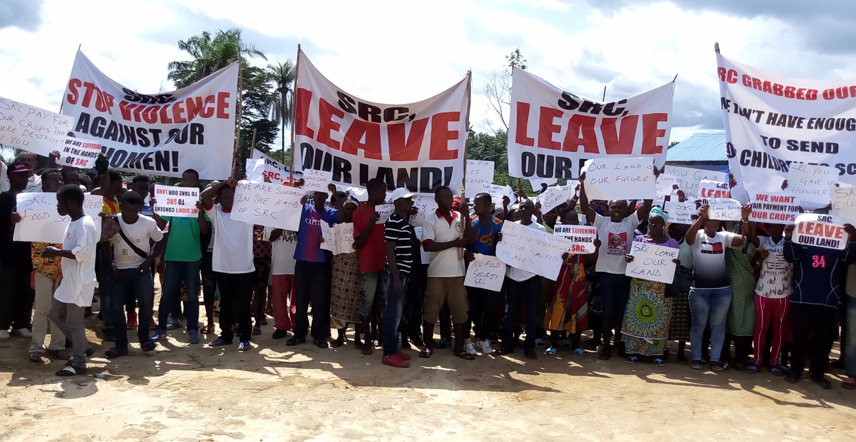
By Witness Radio team.
What began in 1959 as a promise of jobs and development has, according to affected communities and civil society advocates supporting these communities, evolved into a prolonged struggle marked by land loss, environmental destruction, and unfulfilled commitments.
In 1959, the Liberian government granted the Salala Rubber Plantation (SRC) a 70-year lease on a 40,500-hectare land concession in District 5, Margibi County, and in District 6, Bong County, respectively, and developed a rubber plantation on 8,500 hectares.
According to the company’s objectives, it aimed to develop the community by creating job opportunities and providing fair compensation to landowners.
“When the company came to Liberia, it presented itself as supporting the government by creating jobs for Liberians. That message appealed both to the government and to the local communities.” John Brownell revealed in an interview with Witness Radio.
But the expected joy never materialized. The arrival of the rubber company brought consequences whose effects are still inherited to this day. For more than six decades, communities in central Liberia have endured hardship, misery, and persistent poverty passed from one generation to the next.
Some people, especially in Lango, Tartee Towns & Deedeta 1 & 2 areas, were evicted from their land to make way for a large-scale Rubber plantation. In contrast, others who have endured violence are still placed in the middle of the company plantations. According to reports, many others whose homesteads border the company plantations are still facing land grabbing as the company extends its expansions.
Salala Rubber Plantation was established in 1959, during a period when Liberia’s land governance system recognized only public land and private land tenures, excluding customary land tenure. Although the land was officially classified as public, community members in the area, including indigenous groups, had already been cultivating it for farming, burial grounds, water sources, and cultural practices.
“Whereas the land was given to the Company for a Rubber project, it was never an abandoned land. Liberians already occupied it from the Kpelle and Bassa, and other ethnic groups. The company didn’t honor their existence; instead, it forced them off their land,” John added.
At least 22 affected communities across Bong and Margibi Counties continue to demand justice, accountability for the damages caused, and redress, highlighting the need to advocate for change.
Although the SRC concession required that land be selected exclusively from unencumbered public lands and prohibited the evacuation of villages within the concession or development area, the land ultimately selected was heavily encumbered, resulting in the eviction of several villages.
According to the concession agreement, the Concessionaire had to pay rental for public lands to be used for the project, “If the Concessionaire cannot reach a satisfactory agreement with any private owner for any land which may be mentioned as aforementioned, the Concessionaire may bring the matter to the attention of the government which agrees to use its for good offices in obtaining for the Concessionaire the use of the land in a manner equitable to the Concessionaire and the respective private owner for just and reasonable compensation.” Part of the agreement, Witness Radio obtained a copy of it, mentioned.
This meant that the company had to compensate the communities whose land was to be used for the project; instead, the company forcefully took over the community lands.
Following Liberia’s civil war, which disrupted and damaged the plantations’ investments, the Socfin Group acquired the Salala Rubber Corporation (SRC) and invested to optimize the plantation and improve social infrastructure. SRC applied for a US$10 million loan from the International Finance Corporation (IFC), an arm of the World Bank, in 2007 to rehabilitate and expand project operations. According to the documents seen by Witness Radio, the 12-year loan investment from IFC was approved in 2008.
Community representatives say that despite the earlier injustices brought to the communities after the government allocated land that was occupied by people to the company, shortly after receiving the IFC loan, the company expanded beyond its concession boundaries, encroaching on the community’s land and deliberately causing other human rights violations.
“During the operations and expansions between 2007 and 2012, they destroyed community sacred sites, polluted water sources, and destroyed their crops without adequate compensation,” Paul added.
Some villages were forced to relocate again. Between 2012 and 2013, affected communities filed complaints with civil society organizations, triggering investigations that found the company liable for multiple allegations.
“And so, by 2012 and 2013, the community then decided to file a complaint with our office. Our office had to work with them to get the government and the company to restore the economic, cultural, and social benefits that the company had destroyed for them. An investigation was conducted and found the company liable for the allegations,” Paul added.
Despite supporting the communities, advocates found engaging with the company challenging. “The communities fought for dialogue with the company, but it failed. We tried to write several letters, but the company refused to honor the dialogue with the community,” he adds.
According to the Alliance for Rural Democracy, when their engagements with the company failed, they filed a complaint with the IFC against the company’s operation.
“When dialogue attempts failed, communities escalated the matter internationally. In May 2019, Green Advocates International, Natural Resource Women Platform, and the Alliance for Rural Democracy supported them in filing a formal complaint with the IFC’s Compliance Advisor Ombudsman (CAO). The complaint involved allegations of: Physical Displacement, Economic Displacement, and Loss of Livelihood; Historical Land Claims by extension, Land Grab; Grievance Handling; and Threats and Reprisals against Complainants—gender-based violence and Harassment, among others —violations that the communities believed infringed on their human rights.
In September 2020, following a compliance appraisal, CAO initiated an investigation into IFC’s environmental and social (E&S) performance concerning the issues raised in the complaint. However, the investigation stalled until June 2023, when the communities staged a peaceful mass action at the World Bank office in Monrovia, demanding redress to their complaint.
Under pressure from communities, CAO finalized its Investigation Report in December 2023 and submitted it to the World Bank’s Board. The CAO report found harm and indications of damage to the affected communities in relation to compensation, consultation, gender-based violence and harassment (GBVH), security threats, land acquisition, Indigenous Peoples, cultural heritage, water quality, and labor practices.
In addition, Socfinaf S.A, owner of SRC, commissioned its own independent investigation led by Earthworm Foundation. The final Earthworm report corroborated the communities’ allegations against the Salala Rubber Corporation.
In response to CAO’s investigations, on March 13, 2025, the World Bank Board approved and issued the Management Action Plan (MAP). The MAP commits IFC to implement a Community Development Program to support livelihood restoration, GBVH prevention, and support to survivors. IFC management was supposed to supervise SRC’s implementation of the MAP actions.
While grievances remain unresolved, Socfinaf S.A. put the plantation up for sale and, in 2024, officially announced the sale of its subsidiary, Salala Rubber Corporation (SRC), to Jetty Rubber LLC. And community advocates also report that IFC’s Management Action Plan (MAP) has never been implemented.
“Before the sale of SRC, the affected communities and supporting Civil Society and Human Rights organizations wrote an open letter to Socfin Management, the Government of Liberia, and Jetty Rubber regarding the liabilities and the active IFC complaint. However, these institutions ignored the content of the letter, thereby allowing Socfin to divest, and Jetty took over the plantation.” Said Windor B.K. Smith of the Alliance for Rural Democracy.
The new owner, Jetty Rubber LLC, has not committed to implementing the IFC’s Management Action Plan. The 22 affected communities are in limbo because they do not know where to turn for justice and redress to their plight.
Related posts:
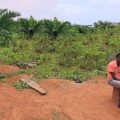
 We are unwaveringly committing ourselves to fight land grabs for tree plantation projects in Africa – leaders of victim communities.
We are unwaveringly committing ourselves to fight land grabs for tree plantation projects in Africa – leaders of victim communities.
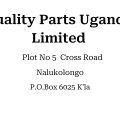 Details Revealed: Who’s a Taiwanese Investor linked to forcefully taking over 2500 hectares of land that belonged to local farmers in the Mubende district for a tree plantation project?
Details Revealed: Who’s a Taiwanese Investor linked to forcefully taking over 2500 hectares of land that belonged to local farmers in the Mubende district for a tree plantation project?
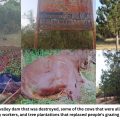 Profiting from misery: A case of a multimillion-dollar tree project sold off before resolving land grab and human rights violation claims with local communities.
Profiting from misery: A case of a multimillion-dollar tree project sold off before resolving land grab and human rights violation claims with local communities.
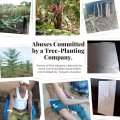 Happy 2025 to you all! Please join Witness Radio again this year to protect thousands of local farmers who are losing their land to a tree plantation owned by a Taiwan investor.
Happy 2025 to you all! Please join Witness Radio again this year to protect thousands of local farmers who are losing their land to a tree plantation owned by a Taiwan investor.
MEDIA FOR CHANGE NETWORK
Indigenous communities’ complaint against World Bank-linked Nepal Cable Car Project declared eligible for investigation.
Published
24 hours agoon
February 5, 2026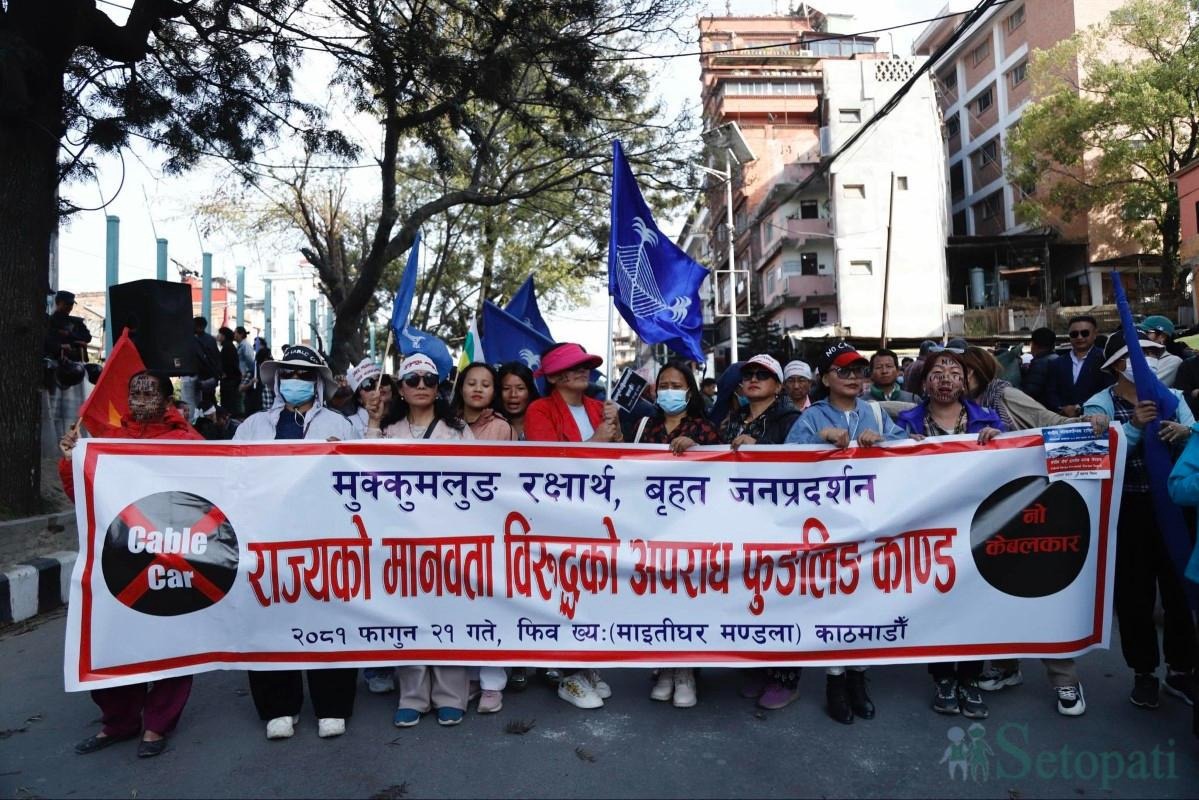
By Witness Radio team
Indigenous Yakthung (Limbu) communities in eastern Nepal have fought hard for recognition after the World Bank Group’s accountability mechanism acknowledged a complaint about rights violations, underscoring their ongoing struggle to protect their land and culture.
The Compliance Advisor Ombudsman (CAO), the independent watchdog of the World Bank Group, accepted the complaint for further assessment and formally registered the case in December 2025. The decision clears the way for a potential mediation process or a full compliance investigation into whether the project breached the IFC’s environmental and social safeguard standards.
In August 2025, Indigenous Yakthung leaders, supported by lawyers and civil society organizations, filed a complaint against the IFC’s advisory support to IME Group for the $22 million Pathivara (Mukkumlung) cable car project in Taplejung District. This filing marks a critical step in holding the project accountable for alleged rights violations and environmental harm.
The cable car is being constructed on Mukkumlung Mountain, a sacred ancestral landscape central to the Yakthung people’s spirituality and Identity, risking irreversible damage to their cultural heritage and Identity.
According to the complainants, construction has already resulted in the felling of more than 10,000 trees in and around the Kanchenjunga Conservation Area, threatening habitats of endangered species such as red pandas, snow leopards, and Himalayan musk deer, underscoring the project’s severe environmental consequences.
“The reason the Complainants and their advisors seek to engage with the CAO is because of the social and environmental harms caused by one of the cable car projects in particular, the Pathivara project. This cable car project has severe impacts on one of the most sacred sites of the Limbu (Yakthung) Indigenous Peoples, including their forests, flora, fauna, heritage (tangible and intangible), and Mukkumlung mountain. The Pathivara project has been imposed on the local Indigenous communities without their Free, Prior, and Informed Consent (FPIC), and has proceeded to destroy their lands, forests, sacred sites, and livelihoods. When the people protest, they have been met with extreme violence and repression by security forces.” The community complaint submitted to the Ombudsman in August 2025 read.
Between August 2022 and July 2024, the IFC provided advisory services to IME Group related to four cable car projects in Nepal, including the Pathivara project. The complainants allege that the IFC failed to ensure that its Environmental and Social Performance Standards, particularly those protecting Indigenous Peoples, were applied.
“The cable car project is tantamount to cultural genocide of the Limbu nation in violation of our rights guaranteed in Nepal’s constitution, the Treaty of 1774 with the Gorkha kingdom, and the UN Declaration on the Rights of Indigenous Peoples,” said Advocate Shankar Limbu, Vice-Chair of LAHURNIP.
Community members say they were unaware of IFC’s involvement until July 2024, nearly two years after construction began, due to the delayed public disclosure of the advisory support.
Accordingly, the complaints stated that the project did not meet the IFC Performance Standards, including failures to assess and manage project impacts, conduct land acquisition, and address involuntary resettlement, among others.
“The IFC’s inability to ensure its client integrated the Performance Standards into the implementation of its plan for delivering cable car projects around Nepal has led to severe breaches of the protections that were supposed to safeguard vulnerable and marginalized communities. Today, Indigenous Limbu communities are being beaten, shot at, arrested, and terrorized for trying to defend their land and way of life,” the community complaints read.
Although the IFC exited the advisory role in 2024, it continues to invest in Global IME Bank, Nepal’s largest commercial bank and a core company within the IME Group. Over the past decade, the IFC has provided more than $50 million in financing to the conglomerate, along with a $500 million trade finance guarantee, which critics say gives the institution ongoing leverage and responsibility.
In its eligibility determination, the CAO found that the complaint met the required criteria, including a plausible link between IFC-supported activities and the alleged environmental and human rights harms. The case has now entered a 90-day assessment phase, during which the CAO will consult with the affected communities, the IFC, and the company involved.
At the end of the assessment, the parties may choose to engage in dispute resolution through mediation or proceed to a full compliance investigation examining whether the IFC failed to follow its own safeguard policies.
The advocates representing the communities welcomed the CAO’s decision.
“We welcome the fact that the CAO has found this complaint eligible, and look forward to working with investigators to uncover how things went so badly wrong. The IFC is currently reviewing its Performance Standards and must learn lessons on consultation, safeguarding cultural heritage and biodiversity, respecting Indigenous Peoples’ rights, and protecting them against retaliation,” Kate Geary, Programme Director at Recourse, one of the organizations that supported the communities in the complaint, reveals.
Further, their appeal is for the CAO to handle the case with utmost urgency. “The CAO investigation into the complaint against the cable car project should move swiftly to remedy ongoing impacts of the project, including retaliations against the local communities,” added Advocate Shankar Limbu.
Indigenous leaders are demanding an immediate halt to construction, the withdrawal of security forces from the area, the release of all IFC-related project documents, and an independent investigation into alleged human rights abuses, urging urgent action to protect their rights and environment.
Related posts:

 CSOs call for meaningful changes in the World Bank’s Dispute Resolution Service to foster access to justice for project-affected communities.
CSOs call for meaningful changes in the World Bank’s Dispute Resolution Service to foster access to justice for project-affected communities.
 The World Bank Must Be Held Accountable for Harm Inflicted on Tanzanian Communities by Tourism Project
The World Bank Must Be Held Accountable for Harm Inflicted on Tanzanian Communities by Tourism Project
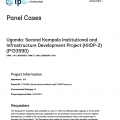 Witness Radio – Uganda and partners welcome a public acknowledgment of the complaint lodged before the World Bank’s Inspection Panel.
Witness Radio – Uganda and partners welcome a public acknowledgment of the complaint lodged before the World Bank’s Inspection Panel.
MEDIA FOR CHANGE NETWORK
The Witness Radio and Seed Savers Network Joint Radio program boosts Farmers’ knowledge of seed and food sovereignty.
Published
2 days agoon
February 4, 2026
By Witness Radio team
Across Africa, seed laws are increasingly structured to favor commercial seed systems, leaving smallholder farmers with limited control over the seeds they rely on for food production. While governments often justify these laws as necessary for quality control and increased productivity, farmers and civil society organizations argue that they deepen dependency, erode Indigenous knowledge, and undermine food sovereignty.
Smallholder farmers produce the majority of the world’s food. Recognizing practices such as saving, exchanging, and replanting seeds can empower farmers and reinforce their vital role in food security.
In response to this challenge, Witness Radio, in partnership with the Seed Savers Network (SSN) in Kenya, is joining hands to save African indigenous seeds by using media to build power and share knowledge and skills with smallholder farmers across Africa and beyond on seed sovereignty and farmer-led food systems.
Last Thursday, Witness Radio and the Seed Savers Network aired the first episode of the program live, featuring representatives of smallholder farmers and civil society organizations from across the African continent. The discussion, which was live on Witness Radio, focused on sharing Indigenous knowledge and practical approaches to saving and conserving African Indigenous seeds.
“It is a crucial time to speak about food sovereignty because, as Indigenous People, talking about food sovereignty is not just an agricultural issue, according to us. It’s a vital act of decolonization and a sign of cultural survival to us and also self-determination.” Said June Bartuin, the Executive Director for Indigenous Peoples’ for peace and climate justice, Kenya, during the first episode of the program.
Across Africa, several policies and laws restrict farmers’ rights to save, exchange, and sell their own seeds. In East Africa, the recently introduced EAC Seed and Plant Varieties Draft Bill 2025 has sparked protests from smallholder farmers and activists, who argue that some of its provisions threaten farmer-led seed systems and favor multinational seed companies.
In Ghana, the Plant Variety Protection Act of 2020 restricts farmers’ seed management practices, underscoring the urgent need for policy reforms that support farmer-led seed systems.
“We have this Plant Variety Protection Act of 2020, which has made it easier for seed companies and the commercial sector to control the seed system,” said Atim Robert Anaab, who works with Trax Ghana and the Beela Project in Northern Ghana, adding that, “The law requires seeds to be certified according to standards that most small-scale farmers simply cannot meet.”
Such laws have reshaped Africa’s food systems by pushing farmers toward commercial seeds that must be purchased every planting season. These seeds are often sold alongside chemical fertilizers and pesticides, significantly increasing production costs for smallholder farmers.
Priscilla Nakato, Chairperson of the Informal Alliance of Communities Affected by Irresponsible Land-Based Investments in Uganda, noted that these policies have also displaced traditional storage and seed preservation practices.
“In the past, every household had a granary, used not only to store food but also to preserve seeds for the next planting season. Many communities still hold this resilience, and reviving these practices can inspire hope for food sovereignty.”
Beyond economics, restrictive seed laws are accelerating the erosion of Indigenous knowledge and cultural practices. June Bartuin explained that women were traditionally the custodians of seeds, preserving them using low-cost methods such as smoke storage in traditional houses.
“This maize could be stored for two, three, even five years, and when planted, it germinated very well,” she added.
The collaboration between Witness Radio and the Seed Savers Network brings together grassroots organizing and community media to amplify farmers’ voices. The Seed Savers Network, a grassroots organization based in Kenya, works with more than 500,000 farmers and supports 121 community seed banks across the country.
According to Mercy Ambani, Resource Mobilization Officer at Seed Savers Network, the organization focuses on rebuilding farmers’ confidence, knowledge, and rights, making platforms such as Witness Radio ideal for reaching farmers directly.
“Our vision is to protect seed sovereignty, conserve biodiversity, and strengthen farmers’ rights through policy advocacy and practical action,” she said.
Through initiatives such as the Seed School, farmers, researchers, and activists are trained in seed selection, storage, preservation, and community seed bank management.
“In December 2024, Kenyan farmers achieved a landmark court ruling that struck down parts of the Seed and Plant Varieties Act, showing the power of collective action and legal advocacy to protect farmers’ rights.”
“This ruling showed that there is power in numbers,” said Ambani. “When farmers raise their voices together, change is possible.”
Regional knowledge exchange is also growing. Farmers from Uganda and Ghana who attended the Seed Savers Boot Camp have returned to their communities to establish household seed banks, kitchen gardens, and farmer field schools.
“My home has become a farmer’s field school. People are hungry for this knowledge,” said Nakato.
Without reforms that recognize and protect farmer-managed seed systems, farmers risk losing control over their seeds — and with them, control over food, culture, and livelihoods.
“If we lose our seeds, we lose our culture, our food, and our future,” Bartuin emphasized.
Wokulira Geoffrey Ssebaggala, Team Leader at Witness Radio, highlighted the importance of creating space for farmers to share knowledge and experiences.
“We are providing a platform where farmers and experts can exchange knowledge on sustainable farming practices. We believe this radio content will have a real impact on food and seed sovereignty across Africa.” Mr. Ssebaggala added.
The radio series will continue to provide practical knowledge, farmer voices, and policy analysis to support sustainable agriculture across Africa.
Related posts:

 Happening shortly! Kenya’s upcoming court ruling on the Seed Law could have a significant impact on farmers’ rights, food sovereignty, and the country’s food system.
Happening shortly! Kenya’s upcoming court ruling on the Seed Law could have a significant impact on farmers’ rights, food sovereignty, and the country’s food system.
 Seed Sovereignty: Most existing and emerging laws and policies on seeds are endangering seed saving and conservation on the African continent.
Seed Sovereignty: Most existing and emerging laws and policies on seeds are endangering seed saving and conservation on the African continent.
 The EAC Seed & Plant Varieties Bill, 2025, is a potential threat to smallholder farmers, as it aims to disengage them from the agriculture business, according to experts.
The EAC Seed & Plant Varieties Bill, 2025, is a potential threat to smallholder farmers, as it aims to disengage them from the agriculture business, according to experts.
 Seed Boot Camp: A struggle to conserve local and indigenous seeds from extinction.
Seed Boot Camp: A struggle to conserve local and indigenous seeds from extinction.

Decades of land loss and chronic poverty: Salala Rubber Plantation prioritizes profit over the well-being of local Liberian communities.

US-DRC Strategic Partnership Agreement Faces Constitutional Challenge in Court

Indigenous communities’ complaint against World Bank-linked Nepal Cable Car Project declared eligible for investigation.

The Witness Radio and Seed Savers Network Joint Radio program boosts Farmers’ knowledge of seed and food sovereignty.

Will Uganda’s next government break the land-grabbing cycle?

Women environmental rights defenders in Africa are at the most significant risk of threats and attacks – ALLIED New report

Swedish pension fund drops TotalEnergies amid rising EACOP risks

Uganda moves toward a Bamboo Policy to boost environmental conservation and green growth.

Innovative Finance from Canada projects positive impact on local communities.
Over 5000 Indigenous Communities evicted in Kiryandongo District
Petition To Land Inquiry Commission Over Human Rights In Kiryandongo District
Invisible victims of Uganda Land Grabs
Resource Center
- Land And Environment Rights In Uganda Experiences From Karamoja And Mid Western Sub Regions
- REPARATORY AND CLIMATE JUSTICE MUST BE AT THE CORE OF COP30, SAY GLOBAL LEADERS AND MOVEMENTS
- LAND GRABS AT GUNPOINT REPORT IN KIRYANDONGO DISTRICT
- THOSE OIL LIARS! THEY DESTROYED MY BUSINESS!
- RESEARCH BRIEF -TOURISM POTENTIAL OF GREATER MASAKA -MARCH 2025
- The Mouila Declaration of the Informal Alliance against the Expansion of Industrial Monocultures
- FORCED LAND EVICTIONS IN UGANDA TRENDS RIGHTS OF DEFENDERS IMPACT AND CALL FOR ACTION
- 12 KEY DEMANDS FROM CSOS TO WORLD LEADERS AT THE OPENING OF COP16 IN SAUDI ARABIA
Legal Framework
READ BY CATEGORY
Newsletter
Trending
-

 MEDIA FOR CHANGE NETWORK2 weeks ago
MEDIA FOR CHANGE NETWORK2 weeks agoWomen environmental rights defenders in Africa are at the most significant risk of threats and attacks – ALLIED New report
-

 MEDIA FOR CHANGE NETWORK1 week ago
MEDIA FOR CHANGE NETWORK1 week agoEvicted from their land to host Refugees: A case of Uganda’s Kyangwali refugee settlement expansion, which left host communities landless.
-

 MEDIA FOR CHANGE NETWORK1 week ago
MEDIA FOR CHANGE NETWORK1 week agoWitness Radio and Seed Savers Network are partnering to produce radio content to save indigenous seeds in Africa.
-

 MEDIA FOR CHANGE NETWORK4 days ago
MEDIA FOR CHANGE NETWORK4 days agoIndigenous communities in Eastern Nepal accuse the World Bank’s Linked Cable Car Project of rights violations.
-

 MEDIA FOR CHANGE NETWORK6 days ago
MEDIA FOR CHANGE NETWORK6 days agoWhy govt is launching a comprehensive digital land registry
-

 MEDIA FOR CHANGE NETWORK3 days ago
MEDIA FOR CHANGE NETWORK3 days agoClose to six years on, Pangero Chiefdom subjects still linger in pain after the government army’s forceful takeover of their ancestral land.
-

 MEDIA FOR CHANGE NETWORK2 days ago
MEDIA FOR CHANGE NETWORK2 days agoThe Witness Radio and Seed Savers Network Joint Radio program boosts Farmers’ knowledge of seed and food sovereignty.
-

 MEDIA FOR CHANGE NETWORK24 hours ago
MEDIA FOR CHANGE NETWORK24 hours agoIndigenous communities’ complaint against World Bank-linked Nepal Cable Car Project declared eligible for investigation.

